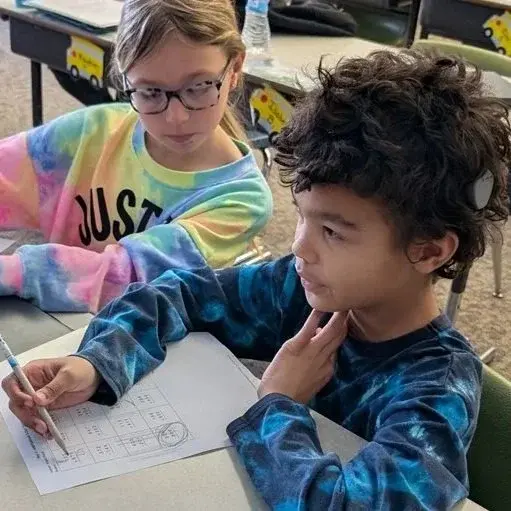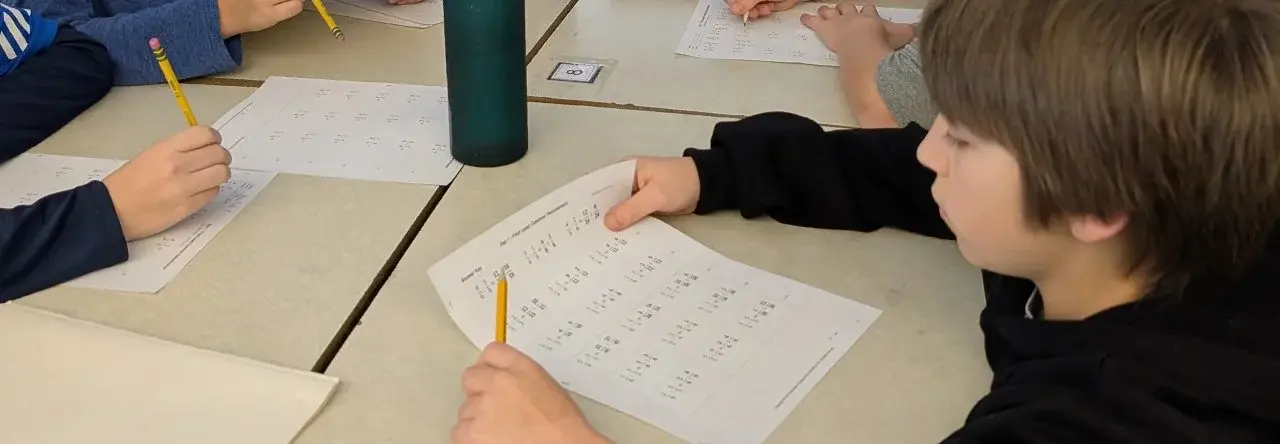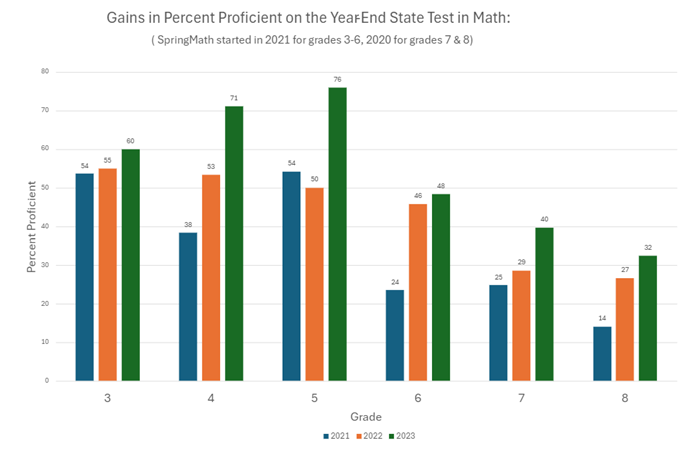Record-breaking math success
Building a culture of growth and achievement through leadership and SpringMath
At Forest Hills School District in Sidman, Pennsylvania, weak math performance once highlighted the need for change. Without a systematic approach to developing foundational skills, students and teachers struggled to make consistent progress.
District leadership, including Assistant Superintendent Dr. Robert Dill, turned to SpringMath to address these gaps and align instruction with data-driven practices. SpringMath has become integral to Forest Hills’ approach to math instruction. It has helped the district achieve record-breaking state assessment scores and create a growth-focused math culture.

Learning from gradual implementation
While many districts choose to implement SpringMath at the elementary level, Forest Hills started in junior high. The district debuted SpringMath in seventh and eighth grade during the 2018-19 school year, with early results showing a need to change the way students were grouped for instruction.
“We learned from our junior high experience and redesigned our whole schedule to allow for SpringMath time,” said Dr. Dill. “We also mixed students into heterogeneous groups and saw tremendous results.”
Fourth through sixth grade began SpringMath in 2019-20, and teachers continued to refine their processes to align with best practices. By the time the COVID-19 pandemic restrictions hit in March 2020, several grades had completed most of their classwide intervention skills, and their progress was reflected in the Pennsylvania System of School Assessment (PSSA).
“Interestingly when we came back the next year and did our PSSAs those grades did fairly well even though we were virtual for part of the year, and we attribute that to SpringMath,” Dr. Dill shared.
These experiences helped district leaders refine their approach as they expanded implementation down to kindergarten.

Leading for buy-in, enthusiasm, and success
|
From the start, leaders set the tone for SpringMath with clear, realistic expectations for staff and students. “Leadership was part of it,” Dr. Dill explained. “We embraced the fact it wasn’t going to be perfect. We allowed teachers to experiment within certain parameters, and the results of the program truly sold it.” To build buy-in, teachers visited classrooms already using SpringMath. These firsthand experiences helped reluctant educators embrace the program. “The kindergarten teachers were the most reluctant at first,” Dr. Dill recalled. “Now, they’re the biggest advocates. The teachers love it. The kids love it. Our students love SpringMath.” At first, math coaches worked with teachers, providing feedback and ensuring correct implementation of the program. Educational consultants from Pennsylvania’s Intermediate Units now conduct these checks and share their findings with the teachers. “This separation of coaching from administrative oversight created trust among teachers,” said Dr. Dill. |
Encouraging a shift from an achievement to a growth mindset also helped transform the district’s math culture. “For some kids, achievement right away is not attainable, but growth is attainable. We all can grow,” shared Dr. Dill. “So, by focusing on growth, we hear students say, ‘Oh, I grew by this today. I’m going to try to do one better tomorrow.’ That’s truly helped change our culture here.” And students across the district are excited about math. “They love knowing their targets and charting their growth,” Dr. Dill said. “I can walk into any classroom and ask a student about their skill or target, and they can tell me exactly where they are. That’s amazing.” |
Breaking math proficiency records
Students aren’t just improving in math proficiency – they’re excelling, as shown by recent statewide assessments. In 2023, fifth grade achieved the highest proficiency scores in the school’s history at 76%. Preliminary data for 2024 testing data shows continued growth with more records to come.
“As our system grows and gets stronger, we're going to see higher student achievement scores,” Dr. Dill said. “It's because we have a systematic approach from kindergarten through eighth grade, and it’s a common practice that’s rooted in research.”

Offering advice to other districts
For districts looking to replicate Forest Hills’ success with SpringMath, Dr. Dill emphasized the importance of leadership, research-backed practices, and a strong focus on data.
Commit to the program and invest in creating the right conditions for success, he advised. “The program can’t make the school successful – you have to make the program successful. That means long-term commitment, fidelity, and trust.”
Patience, he added, is also critical. “The first year or two of any new program can be rocky,” he said. “Any change takes three to five years to see significant growth. Don’t try it for a year and get rid of it. Stick with it, and you’ll see the results.”
Looking forward to continued success
Forest Hills plans to continue advancing student math proficiency with SpringMath while strengthening their MTSS practices.
“It’s a non-negotiable for us,” said Dr. Dill. “SpringMath has made a transformational difference in our district.”
Reflecting on the program’s impact, he shared: “It’s a blessing when you can see both the qualitative evidence based on teacher testimony and the quantitative data in the test scores saying the same thing.”
